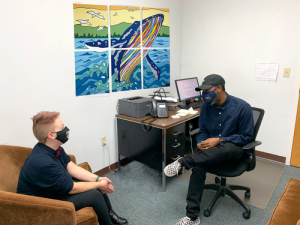Mental Health and Youth: How Bridge is supporting vulnerable youth

May 11, 2022
Mental health is one of the keys to stability and self-sufficiency for all young people. For decades, Bridge has prioritized mental health programs and services, knowing homelessness is traumatic and our youth have often suffered abuse, faced violence on the streets, and lacked a safe and caring home.
Now, more than two years into the COVID-19 pandemic which has created greater isolation and anxiety for everyone and particularly for young people, leading pediatricians, psychiatrists, and the US Surgeon General are declaring an unprecedented state of emergency in youth mental health. For youth experiencing homelessness, this crisis is devastating.
In response to the increased rates of depression, anxiety, and trauma in the young people we serve, Bridge strengthened our behavioral and mental health services by:
-
adding Behavioral Health Therapists to our counseling team to increase the number of therapies available to youth, including cognitive behavior therapy (CBT) and dialectical behavior therapy (DBT);
-
initiating new research projects to study the intersection of substance use and accessing help as well as mental health and success in housing;
-
incorporating telehealth services to ensure youth can access counseling while keeping physical distance;
-
expanding access to psychiatry through our partnership with Mass General Hospital; and
-
embedding licensed clinicians directly into Bridge’s residential programming to bolster youth progress made during counseling sessions.
Interested in learning more and supporting critical behavioral health services at Bridge?
-
Read a recent op-ed from Bridge’s CEO Elisabeth Jackson about the growing youth mental health crisis in Commonwealth Magazine.
-
Follow Bridge on social media for ongoing behavioral health program updates:
-
Make a gift online to support critical mental health support for vulnerable youth.